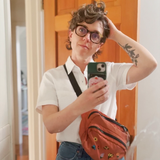I grew up in a church led by a prophet
If I followed him, my family would stay together forever

There is nothing mysterious or natural about authority. It is formed, irradiated, disseminated; it is instrumental, it is persuasive; it has status, it establishes canons of taste and value; it is virtually indistinguishable from certain ideas it dignifies as true, and from traditions, perceptions, and judgments it forms, transmits, reproduces. Above all, authority can, indeed must, be analyzed.
- Edward Said
Sometimes we pretend prophets are figures that only exist in ancient texts and myths. But there are prophets everywhere.
Some of our prophets are digital seers. Ancient astrologists analyzed the historical movement of the stars and the movement of men on the earth to predict the future. Google maps analyzes historical traffic and live data about current movement to predict traffic in the future. Some of them are capitalist augeres. In ancient Rome, an augur studied the natural phenomena and the flight of birds to know the will of the gods. Every private company valuation is just a handful of investors interpreting lightning strikes and the distance of vultures.
Some of them are dowsers. Elizabeth Holmes promised to find the things buried in our blood with her own version of a dowsing rod, the Edison machine. Investors gave her their faith and $700 million dollars, hoping she’d lead them to cures and cash. Some are false prophets. Qanon isn’t the world’s most organized conspiracy theory, but at its most basic level, Q was a self-proclaimed prophet foretelling the future with Q drops. Rioters followed those drops right into the Capital on January 6th.
There are a lot of reasons we follow prophets. Greed, power, fear, belief, love. Mostly, I think we follow prophets because we don’t want to lose our way.
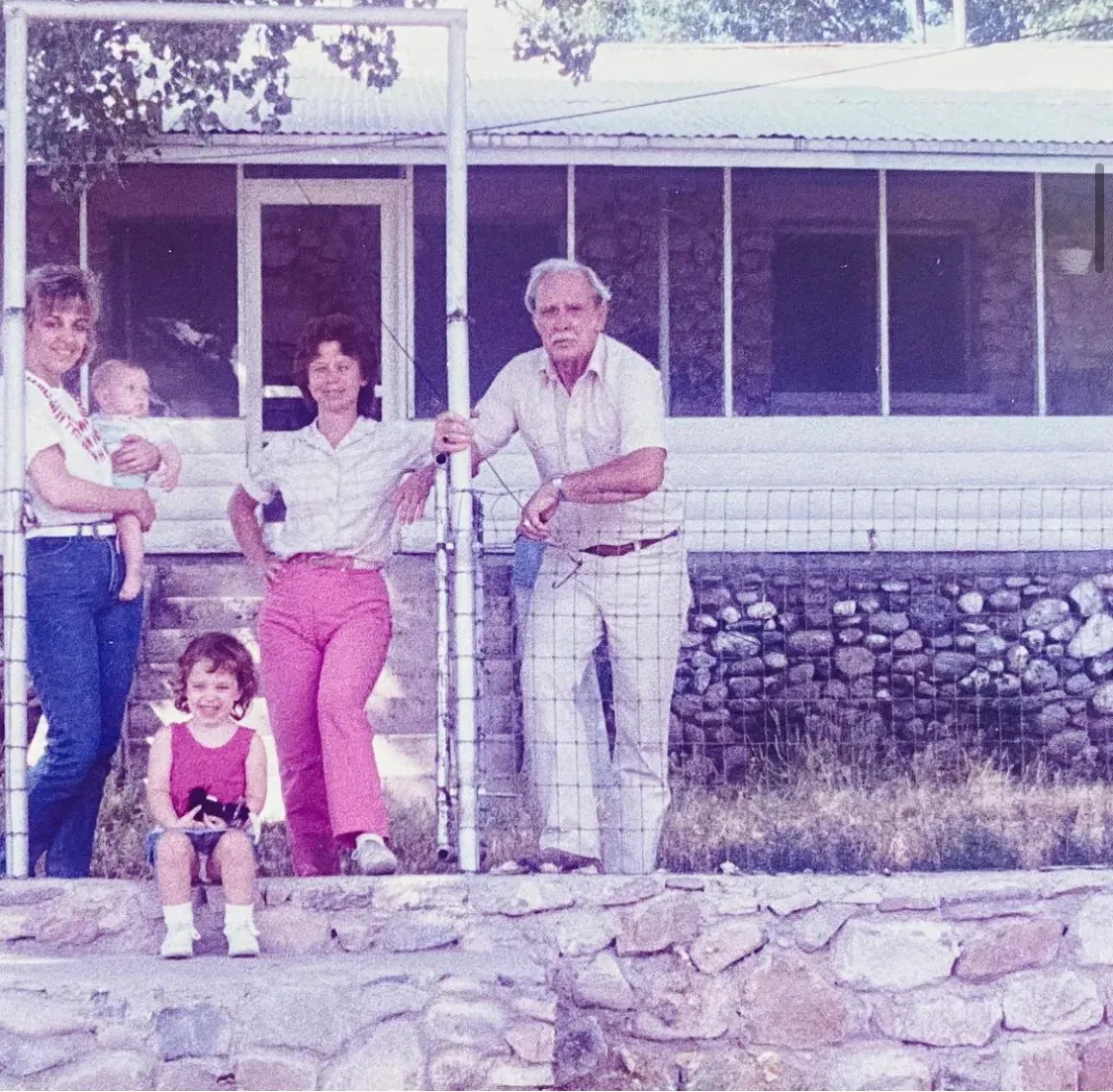
I grew up in a church led by a prophet. The Church of Jesus Christ of Latter-day Saints. You might know it as the Mormon Church. I was taught that if I followed the prophet, I’d never wander far from God. As a kid, I wasn’t really worried about being away from God. I was born away from God and doing just fine! But I wasworried about being away from my family. I didn’t want to lose them. I often turned down invitations to sleepovers, terrified my parents would die while I was away celebrating some kids’ birthday. I thought if I stayed home, I could keep them safe and with me.
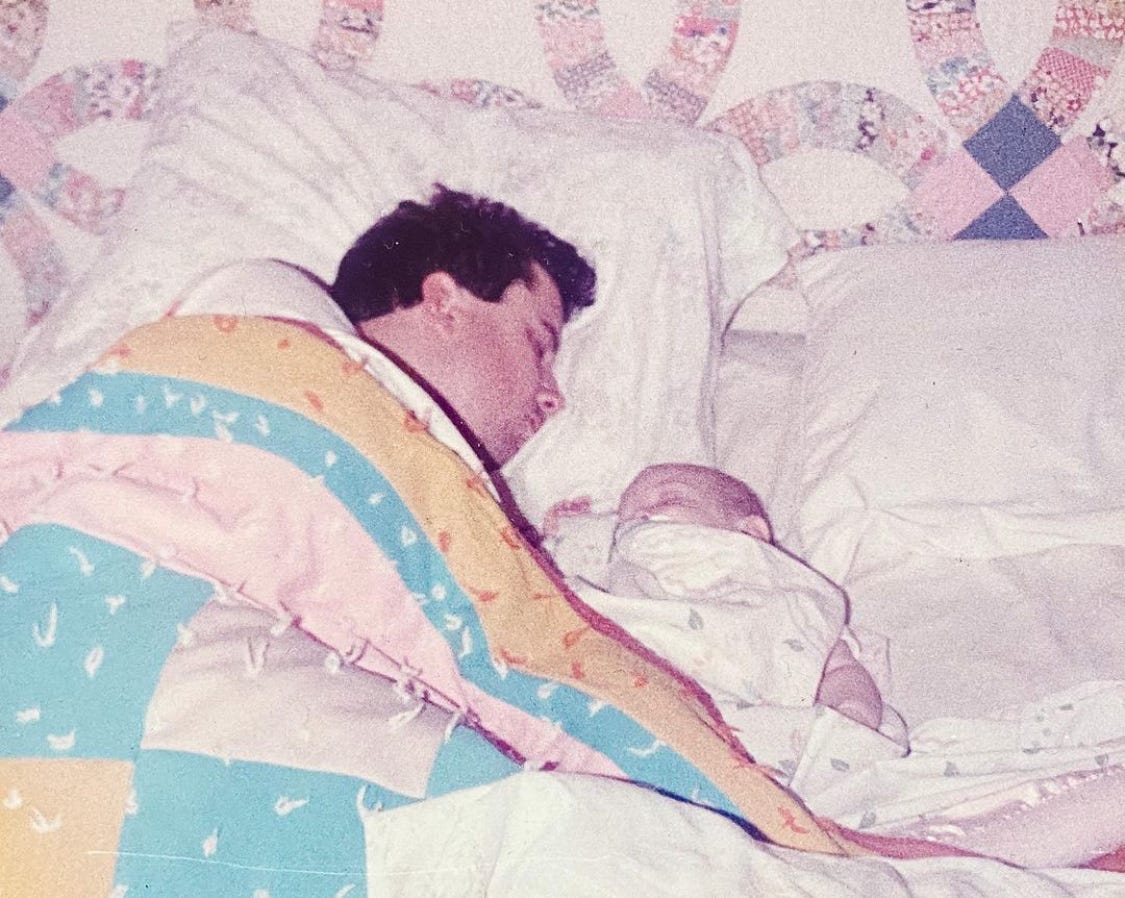
Of course, I knew my parents would die someday. We all would. That’s where following the prophet came in. I wanted to be led to God because God lived in Heaven. Heaven was the place I’d been taught my family could be together forever.
In Sunday school, I was taught anyone could hear God through what my teachers called personal revelation. Personal revelation mostly came through the Spirit, through feelings and thoughts. We had to listen closely. When I prayed by my bed each night, I’d pause afterward with my eyes closed, allowing enough silence to hear quiet things. It was my right to be in dialogue with divinity.
I could hear God. But only the prophet had the authority to speak on behalf of God. I would never be a prophet, because I was a girl. Only men can be ordained to the LDS priesthood. And only priesthood holders can preside in the church.
It was my right to be in dialogue with divinity.
Sometimes a member of the church heard something quiet that contradicted the prophet’s words. When this happened to me, I knew I just hadn’t been listening closely enough. I had to listen for echoes of God, while the prophet heard God directly. I wouldn’t always get it right. Quiet contradictions were mostly okay, as long as members didn’t try to teach them loudly.
The church was started by a man who taught the quiet things he heard loudly. Joseph Smith had what Paul called charisma - he was endowed with gifts that allowed him to communicate with God. Smith said he talked with angels, and had visions.He laid his hands on people’s heads and blessed them with healing. Smith taught that God’s authority had been taken from the earth after Jesus Christ and the apostles died. He called this authority “keys to the priesthood” and said that, “The keys have to be brought from heaven whenever the Gospel is sent.”
When a leader holds priesthood keys, they hold the right to preside over and direct the church. Smith taught church members that he was given the priesthood keys by heavenly messengers. It was his calling to restore the true church to the earth. As part of the restoration, he called apostles. When Joseph Smith began to practice polygamy, the keys gave him the authority to do so. Smith’s church was as charismatic as he was. Women gave healing blessings. Men had visions. People heard God.
Max Weber, a 19th century German sociologist, studied Joseph Smith as he developed his concept of “charismatic authority.” Charismatic authority is naturally unstable because it’s derived from the charisma of a leader. It exists in opposition to traditional and legal authority. Many revolutionary leaders are charismatic. This authority can be easily undermined by other charismatic people.
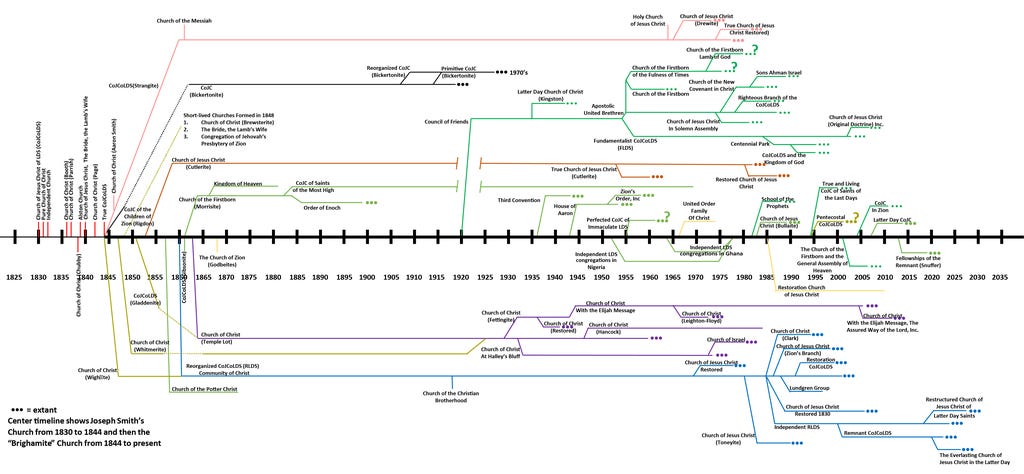
Sometimes people become too charismatic to fit within the existing power structure of a charismatic church. When this happens, they’re excommunicated or they leave. They often take followers with them. The church members who remain call these leaders false prophets. The church members who follow them call them true prophets. Mormonism has splintered this way many times. The LDS church is just the biggest branch of Smith’s original church.
It’s hard to keep charismatic authority, but it’s also hard to transfer it. In 1844, Joseph Smith was killed by a mob in Illinois. The LDS church survived and stabilized after his death because of what Weber called the “routinization of charismatic authority.” Charismatic authority was transferred from the prophet, to the office of the prophet. Whoever is in the office of the prophet, holds the priesthood keys. Apostolic succession fills the office. When a prophet dies, members of the church mourn, but they do not despair. They know a prophet still lives.
After Smith’s death, an apostle took the keys and became a prophet of the LDS church. His name was Brigham Young. The saints followed him west to the territory that would become Utah. Hoping to escape religious persecution, they settled a “promised land” that was not theirs. Heaven on earth was easily mapped with a prophet. Brigham Young instructed the saints to split Salt Lake Valley into a grid of ten acre plots, each divided into eight parcels. Salt Lake City is still incredibly easy to navigate because of Brigham Young’s grid.
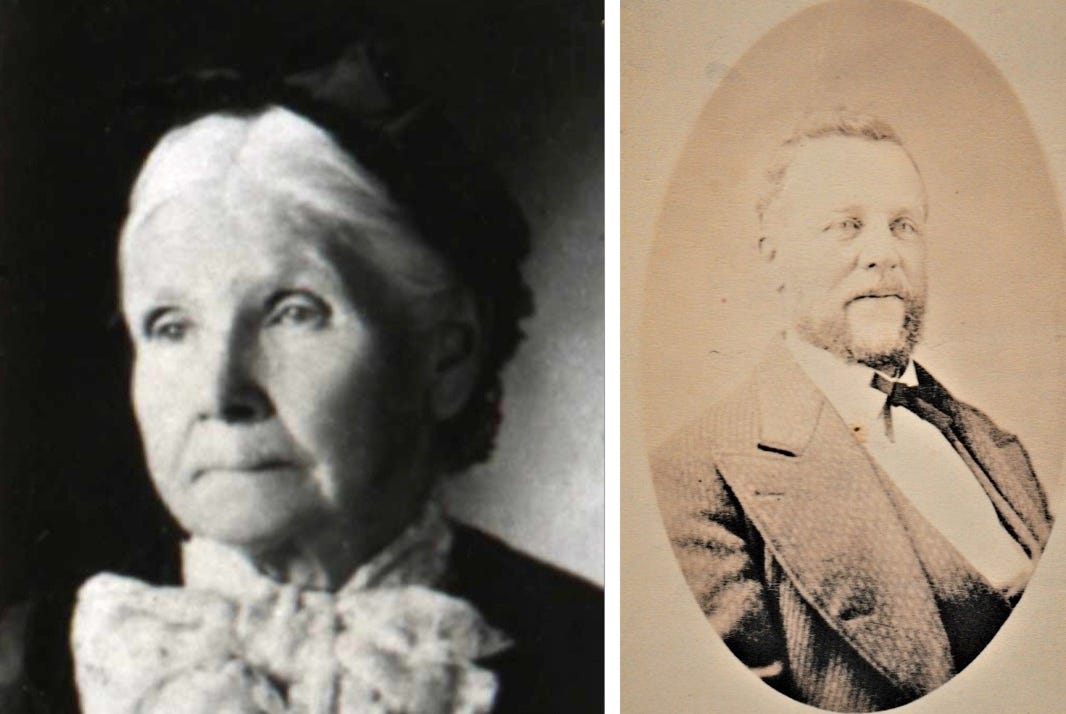
Eleanor and Thomas Ord, two of my ancestors, joined the LDS church in England. They were married weeks before emigrating to Utah. In 1856, they set sail on a ship called Horizon with hundreds of other believers. They arrived in Boston and took a train to Iowa. They'd walk with handcarts from Iowa to the Salt Lake Valley. Many Mormons did this without calamity during the 1850s. But Thomas and Eleanor were part of the Martin Handcart Company. They did not escape calamity.
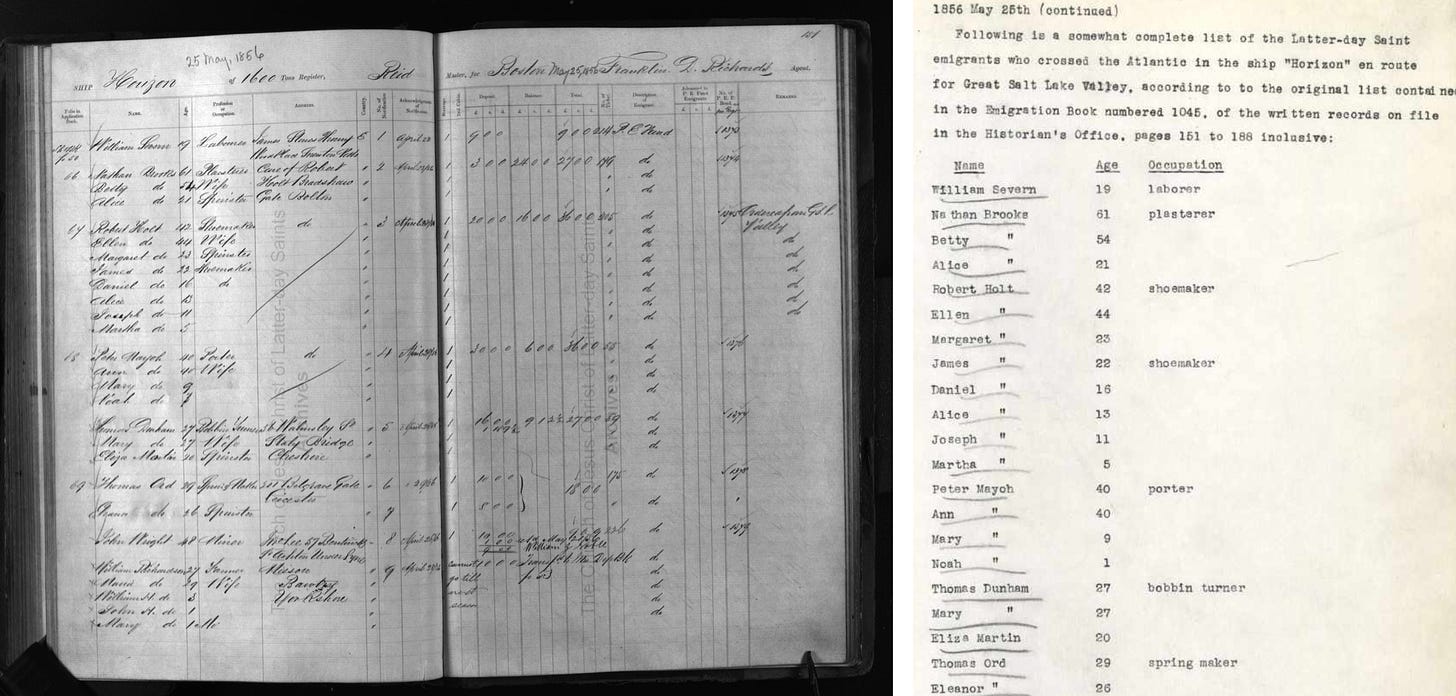
The company left too late in the season, with hand carts made of greenwood. As Eleanor walked, the skin on her hands and feet split, and so did the uncured wood of her cart. Eleanor said she knew angels attended her because she was following the prophet. I wonder if the angels ever slowed their steps, worried about attending the colonization of Indigenous land. The handcarts fell apart. The weather grew cold. The food ran out. People began to die on the frozen plains of Wyoming.
What authority does a woman need to do the work of salvation?
Snow and starvation swept through the company. Eleanor used her poorly repaired cart to carry people who could not walk. She carried a disabled eight year old boy. His mother’s cart was full of other children. I do not know where his father was. The boy died in Eleanor’s arms. After they buried him, Eleanor passed a man collapsed in the snow. Others passed him too. Dying people can’t always save dying people. But Eleanor could not bear to leave him behind. She turned her cart around and, with the help of another sister, struggled to get him into it. She pulled him behind her until he could walk again. Her granddaughter remembered him visiting once, decades later, to thank Eleanor for saving his life. What authority does a woman need to do the work of salvation?
Brigham Young learned about the scale of the unfolding tragedy during General Conference, the semiannual meeting when members gather to hear the prophet and apostles speak. Young told the gathered members of the church to form rescue parties. He said, “Go and bring in those people now on the plains.” It wasn’t without risk. The handcart company was hundreds of miles away. Helping frostbitten, starving people cross those miles would be difficult. Have you been on the Wyoming plains in the winter? The wind whips until it raises welts. I can’t imagine moving hundreds of emaciated people across that land and windscape. Go and bring in those people. Young’s words are stirring. And the actions of the people who followed them were stirring too.
God doesn’t leave people out on the plains or out of heaven.
When I think of asylum seekers at our border, Young’s words repeat in my head, “Go and bring in those people.” But Brigham Young didn’t really believe in bringing in all people. In 1852, he declared that Black men could no longer be ordained to the priesthood, and Black people could not access many of Mormonism’s most sacred rites. The ban lasted until 1978. Mormons believe the priesthood and those rites are necessary to reach the highest places in heaven. God doesn’t leave people out on the plains or out of heaven. But Young was only interested in bringing in certain kinds of people. In the 1800s, my white ancestors were his certain kind of people.
Word of the rescue parties arrived before they did. I imagine Eleanor, huddled in the cold, her eyes narrowed and watching the horizon, waiting to see the first shapes of salvation - men, horses and wagons. When they appeared, the people who had the strength rose from their frozen beds and cheered. As the pioneers limped into the valley, Young told his followers to open their homes and cupboards, “Prayer is good, but when baked potatoes and pudding and milk are needed, prayer will not supply their place….” So that’s something Young and I agree on, it seems.
Eleanor and Thomas were so malnourished they couldn’t eat potatoes or pudding. They subsisted on tablespoons of soup for weeks as they regained their health. 150 people in the Martin Handcart Company died, over a quarter of the people in the company. The rescue parties saved hundreds of lives that might have been lost too. They followed their prophet and brought the people in from the plains, so Eleanor lived. And so I live. One of my husband’s ancestors was in the rescue party. I sometimes wonder if Eleanor saw his shape against the horizon before she closed her eyes in relief.
Riley and I met in an LDS church building when we were twelve years old. Twelve is the age when boys and girls in the church get sorted by their access to authority. Twelve year old boys are ordained to the priesthood. Twelve year old girls are not. I didn’t think about how our church treated us differently. I was just grateful we both belonged there. We became best friends. I’ve loved Riley since I was fourteen years old.

He didn’t love me back. In high school, he’d tell me about the girls he was dating. I’d bite the inside of my cheeks to keep from telling him how I felt. I watched and re-watched She’s All That and Never Been Kissed. And sometimes I cried. But once in a while, a quiet thing would press through the noise of teenage agony, “Don’t worry. This one actually works out the way you hope.” I did worry. And it did work out. I don’t know if I am attended by angels, but I am attended by Riley. I am attended by Riley because in the 1800s we each had family members follow a prophet.
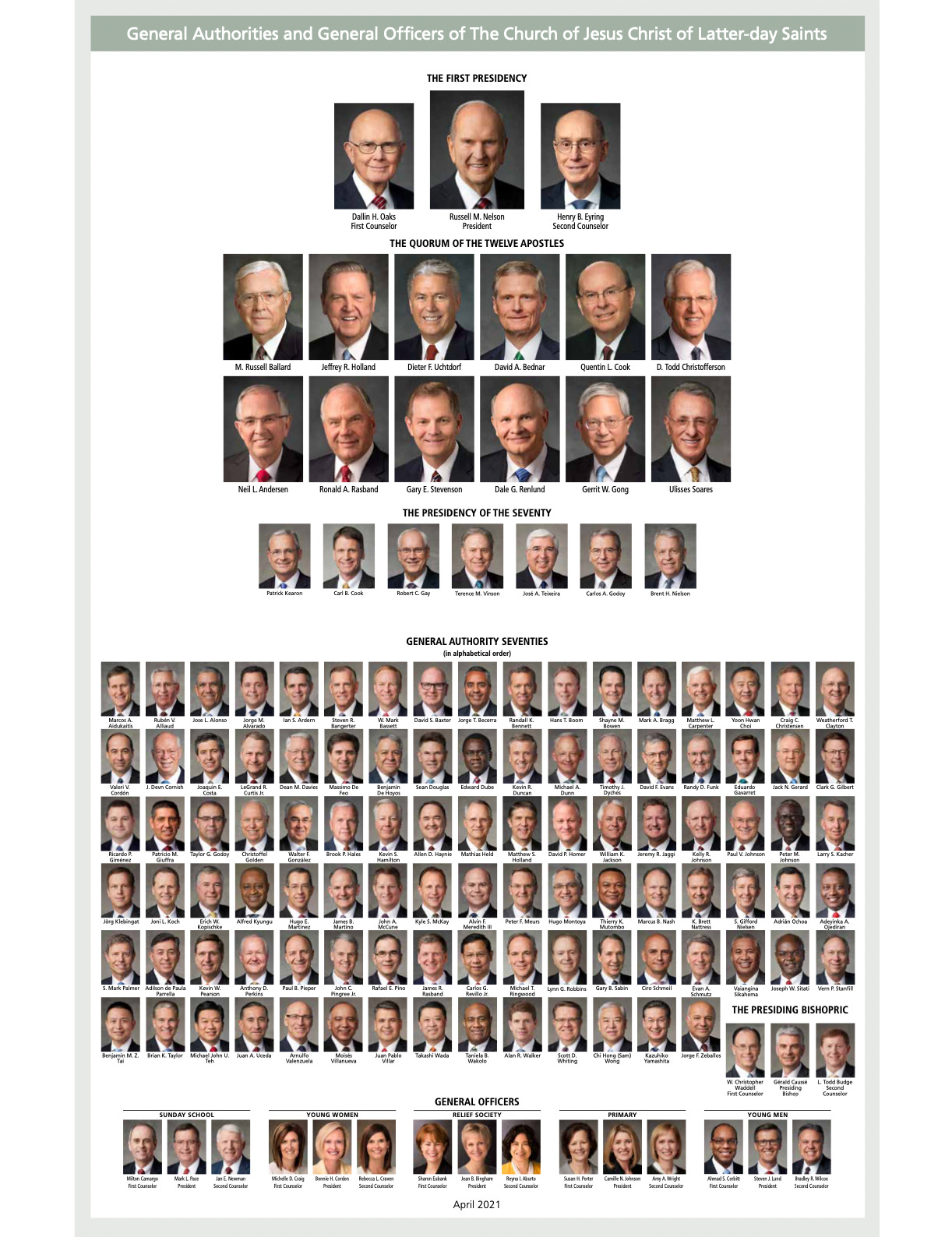
Eleanor and Thomas settled in Utah. The church settled there too. Charisma slowly leaked out of the church members’ experience as charismatic authority became increasingly structured. By the time I was a young Mormon girl in the 90s, women were not allowed to give blessings. What little charisma the faith maintained was firmly placed behind the lines of the male-only priesthood. There is a prophet at the head of the church, with apostles nested beneath the prophet, and layers of male-only leadership rolls nested beneath the apostles. Only men can bless the bread, only men can lay their hands on a bowed head to offer blessings of healing or comfort. Visions are mostly contained to the stories in our history.
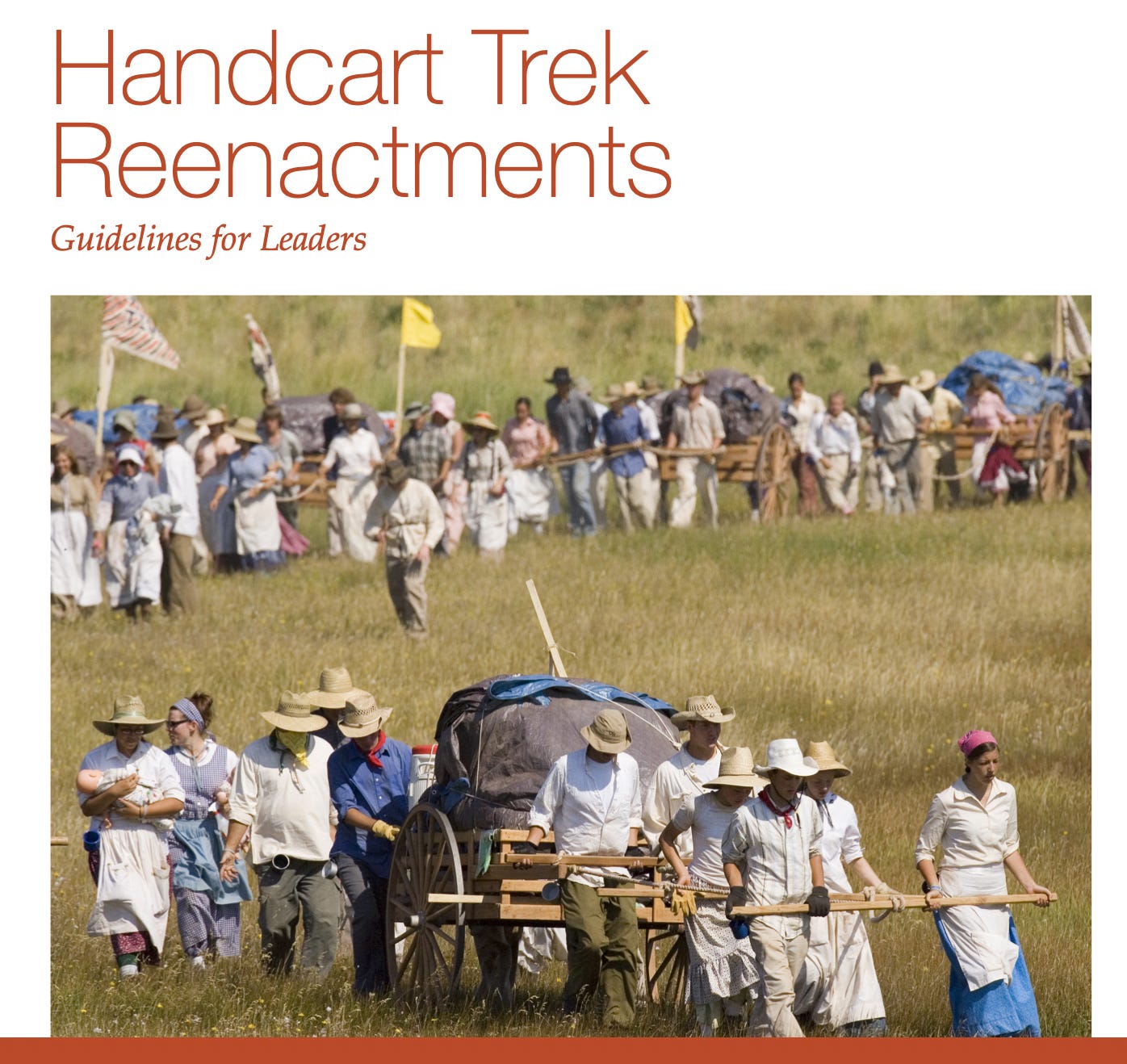
In some LDS congregations, teenagers go on weeklong pioneer reenactment trips called trek. Sometimes, they take the same route Eleanor walked; play-acting walking with angels as they followed the prophet. I wonder if they ever pass that little boy’s unmarked grave. They pull handcarts and sing ‘Follow the Prophet’,
Adam was a prophet, first one that we know.In a place called Eden, he helped things to grow.Adam served the Lord by following his ways.We are his descendants in the latter days.Follow the prophet, follow the prophet,Follow the prophet; don’t go astray.Follow the prophet, follow the prophet,Follow the prophet; he knows the way.After Adam came verses about Enoch, Noah, Abraham, Moses, Samuel, Jonah, and Daniel. And then the last verse,
The LDS prophet and apostles still speak at a General Conference every six months. It’s televised globally. Growing up, my family watched sporadically. When we did watch, it wasn’t unusual for my parents to interrupt a talk to say, “Well…that’s not true.” Many LDS families see it as a time to check in with how well they’re following the prophet. They make a weekend event of it. Cinnamon rolls rising the night before each morning meeting. Mothers put together church-themed craft kits to keep bored kids engaged. The older kids and adults keep their journals open so that they can take notes. They’re listening to men who speak with and for God. It can be such a hopeful scene. And it can be such a harrowing scene.
The leaders of the church are called “prophets, seers and revelators," but they don’t share visions like Jeremiah or even Joseph Smith. They share messages about God’s love, Christ’s atonement, repentance, the nuclear family, and following the prophet. People who don’t follow the prophet can’t be led to the highest places in heaven, the places that hold God. The places that hold a family together.
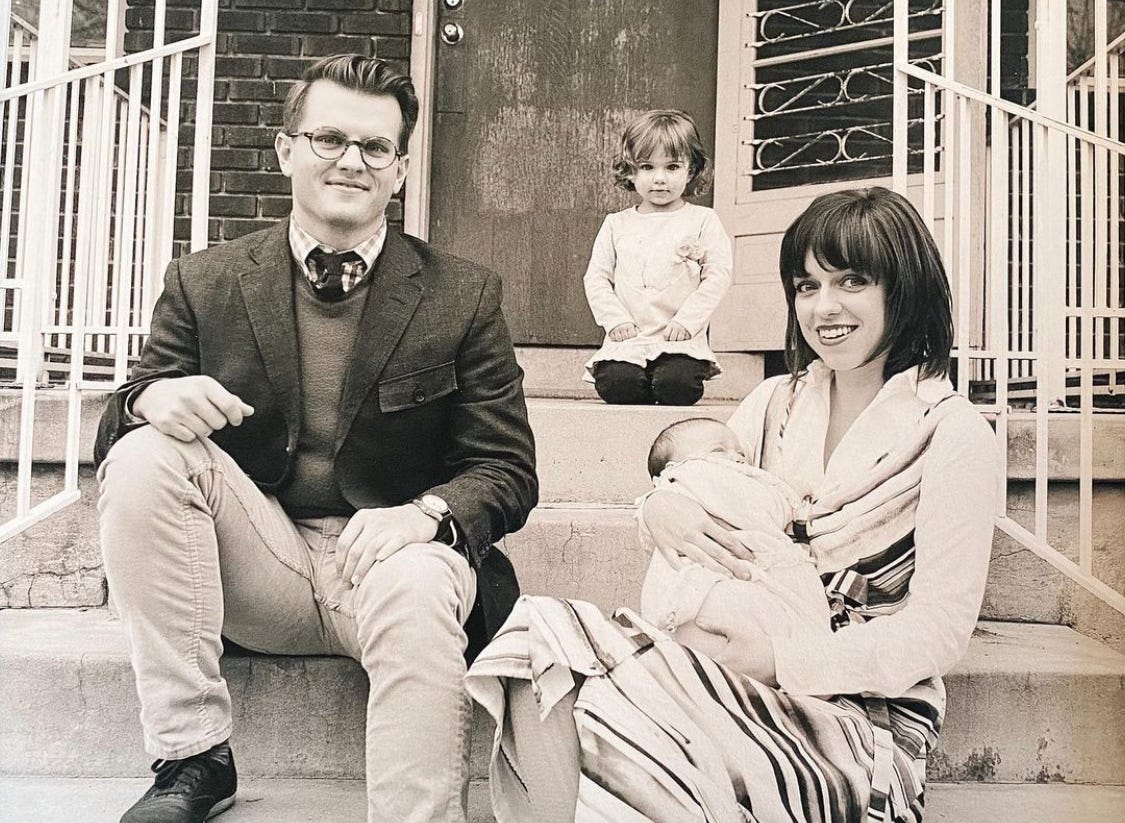
Riley and I got married when we were 21. We had our first child when we were 24. I started watching every session of General Conference after our first baby was born. Sometimes I’d hear a sermon and say, “Well…that’s not true.” But then I’d feel guilty. I fretted about disappointing my ancestors - they’d given up so much to follow the prophet. Who was I to not follow them?
My dad died when I was 28. (I guess I could have gone to all those sleepovers as a kid.) Priesthood authority promised me a path back to him. I followed the prophet because I wanted to get to the place where my dad waits for me. I pulled my children after me, because I wanted them to understand how to get to the place I will wait for them.
But the prophets seers and revelators kept teaching things I knew weren’t true - the exclusive sacredness of traditional marriage, eternal gender roles, the whiteness of Jesus, a God who doesn't bring us all in. My heart started to split from the cold. I tried to stay warm by writing about my own queerness, the holiness of all love, the fluidity of gender and the many colors of God. I huddled next to true things that still spark within the religion. With the right fuel, they’ll make a holy fire. But I found myself in a frozen place with no shapes of salvation crossing the horizon. I closed my eyes, and listened for quiet things.
One day I realized the horizon had changed. I’d wandered. But I hadn't lost my family. They were still beside me, the ones still living and the ones now buried. My husband, my daughters, my parents, my grandparents, my sisters, my brother. I suppose I was waylaid by the signs and wonders of God’s love. I walk in rounds now, weaving in and out of understanding. There’s no one in front of me or behind me. I can’t even pull my children behind me. Not really. They weave in and out around me and beside me.
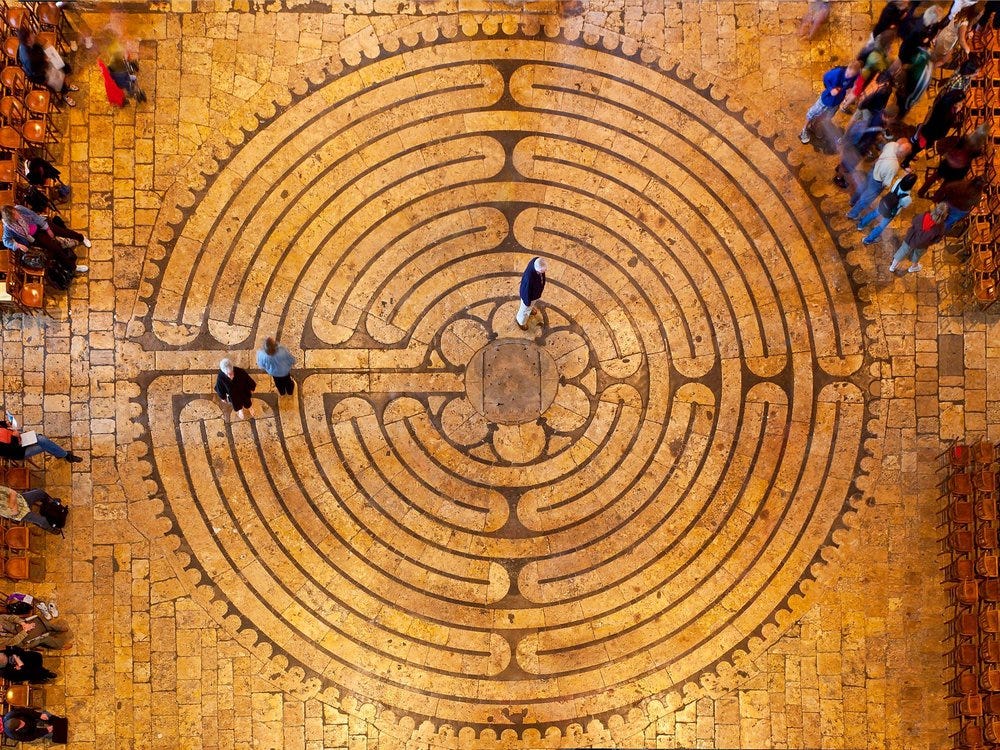
General Conference was two weekends ago. My family didn’t watch, but we did gather. My brother and sister-in-law came over for reuben sandwiches. They sat at the kitchen table to keep me company while I made the russian dressing. (Did you know that it’s called russian dressing because in the early 1900s it included caviar as an ingredient?)
Riley was in the living room with the kids. He’d come in to slice the corned beef against the grain and assemble the sandwiches once the dressing was done. He’s better at making sandwiches than me. Maybe because he’s always been better at understanding the proper ratio of things. I’d just finished grating the horseradish when my brother held up his phone,
“Meg, have you seen this meme? The one where you’re on a list of false prophets?”
I had not.
The meme was made by an LDS woman in preparation for General Conference. On the left side she’d listed “True Prophets. The prophet and the apostles who lead the LDS church. They were listed in descending order of seniority. On the right side, she’d listed “False Prophets.” It was mostly a list of women. There were a few men. I don’t know if she ordered this list by perceived seniority. My name was at the very bottom. A last minute addition or a punctuation point. An LDS woman can never be a true prophet, but she can be a false prophet.
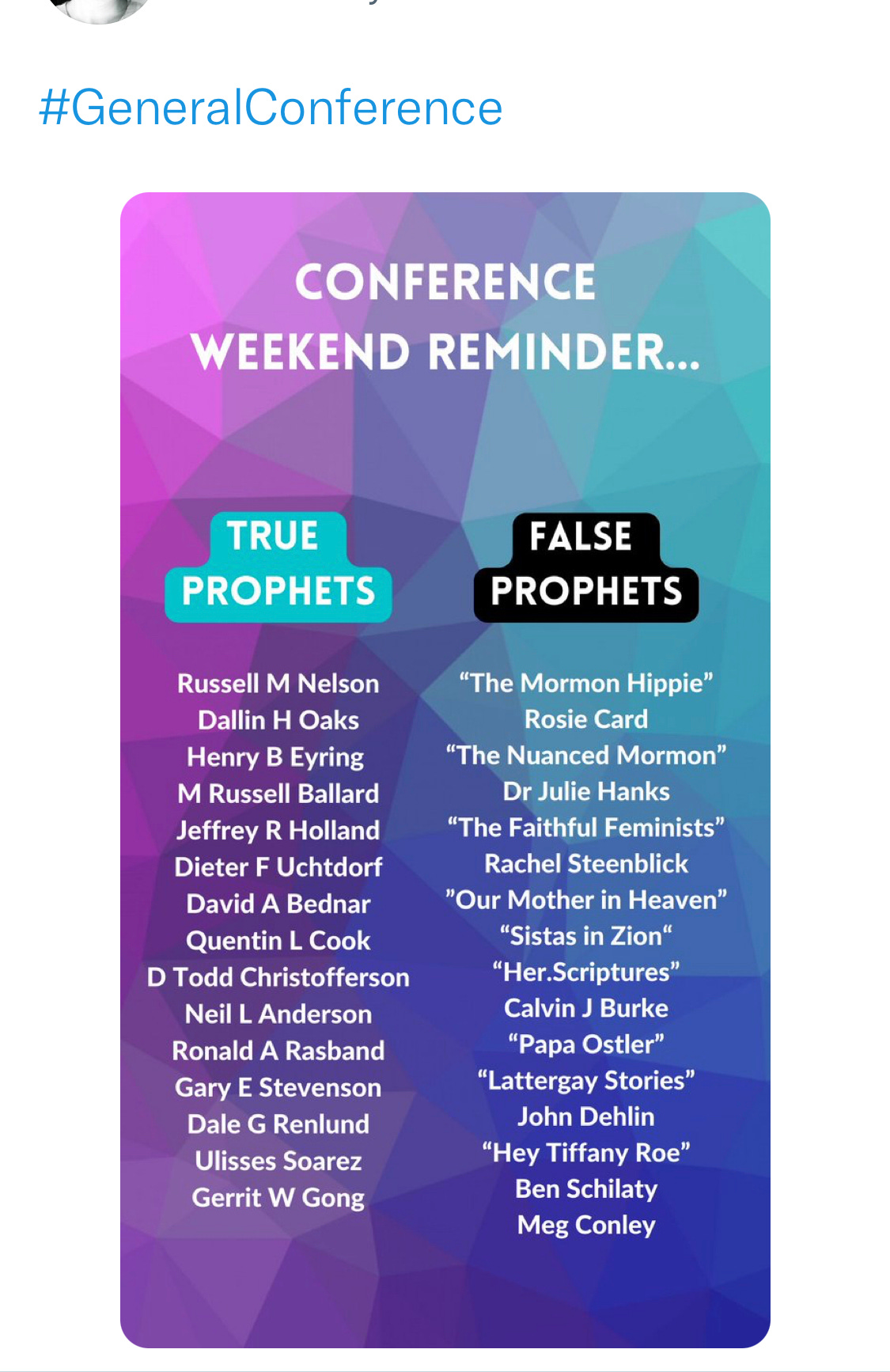
I laughed about the meme as I scraped the horseradish into the dressing. It was ridiculous. But it wasn’t really funny. That woman made that list because she is afraid of getting lost. And she is afraid of losing others. I don’t want her to be afraid.
My oldest daughter asked what made me laugh. Kids hate missing out on jokes. When I told her about the list, she looked incredulous. I can’t say I blame her. Earlier that day, she’d caught me crouched behind a cabinet, eating the last of the salt and vinegar chips. I didn’t want to share them, so I was trying to sneaky snack. I guess it’s hard to picture a prophet - false or true - hiding kettle chips from her kids.
A false prophet has no honor in her own kitchen.
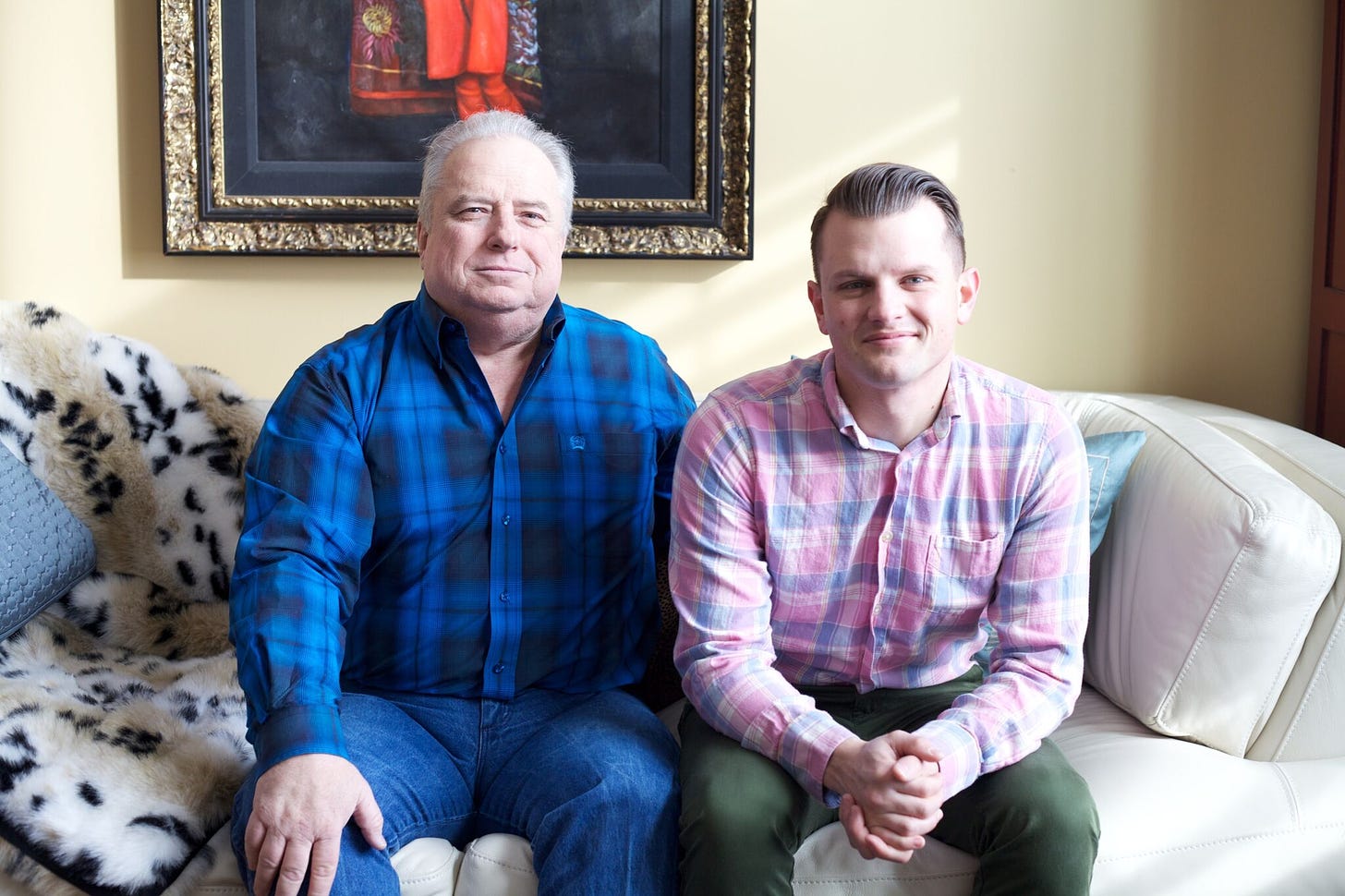
I was cooking dinner with my dad, when his death echoed back to me from a place just ahead of us. Just the slightest vibration, heard by some part of me I’ve never been able to name. I knew suddenly that he didn’t have much time. I was cutting an onion. Dad was cutting a tomato. I can’t remember what we were cooking. He wasn’t sick. He was still so young. But I'd heard what was coming.
I started to weep. Dad looked up at me, worried. I just gestured to the onion. I’ve never been able to cut onions without crying. On the way home that night, I told Riley. “My dad is going to die soon.” Riley told me it was okay, just an anxious thought from an anxious brain. Dad was diagnosed with cancer that Christmas. He died fourteen months after his diagnosis.
I’ve wondered about that soft echo and that accidental prophecy. I asked my dad’s doctor once if I could have smelled the cancer, kind of like dogs smell it. She said he wouldn’t have had the cancer yet. I kind of laughed, nervously, “You must think I’m crazy.” She didn’t. She said she’d grown used to mystery.
Why could I hear that quiet thing? What is that? I don’t know. It could have been a coincidence. Or maybe there is a scientific explanation. Or maybe the future does really send waves back through the present. The only thing I know it isn’t is authority. Authority is not mysterious.
The hierarchical structure of authority in the LDS church forms a pyramid, but God builds in rounds. Atoms and cells are spherical. Spheres have the greatest volume to surface ratio and fluids contract to the smallest possible space. Water would form perfect spheres if gravity wasn't getting in the way. Instead, it forms into droplets. Some people say spacetime is fluid. That means it’s always contracting into a sphere. So existence is a circle too. If divine authority exists, it’ll make a shape that looks more like my round kitchen table than anything that can be traced top to bottom.
And even still, can’t people’s winding paths curve through that top down structure? Can’t God be found in following a prophet too? Yes! And of course! God can be found anywhere, because God meets us where we are. God met my mom and dad in the LDS church. And they taught me how to meet God in the LDS church.
Walter Brueggerman is a Hebrew Bible scholar and Christian theologian. In his book, The Prophetic Imagination, he wrote that, “The task of prophetic ministry is to nurture, nourish, and evoke a consciousness and perception alternative to the consciousness and perception of the dominant culture around us.” He calls this the ministry of the imagination. In a 2018 interview, Brueggerman said, “The task [of the prophet] is reframing so that we can re-experience the social realities that are right in front of us, from a different angle.”
There is a universe passing through you and me as we pick up LEGO bricks, cut onions, drive to work, walk to the library, bury our parents and scroll through Twitter.
Did you know dark matter makes up 85% of the matter in the universe? Dark matter passes through us, but we cannot see or detect it in any way. We do not know what it is made of, we do not know if it is one kind of particle or one million kinds. Some scientists think it’s possible it’s many different kinds of particles that make an entire shadow universe. If they’re right, there is a universe passing through you and me as we pick up LEGO bricks, cut onions, drive to work, walk to the library, bury our parents and scroll through Twitter.
I can’t gather authority or certainty from such an abundance of unknown. What isn’t possible? I hope angels did walk with Eleanor. But it is not my duty to follow her as she followed the prophet. I could not follow her, even if I would. She and I walk round each other, parting and meeting again and parting.
My dad gave me a priesthood blessing two nights before he died. He put his hands on my head and said my name, Megan Elaine Conley, before blessing me with a knowledge of God, the love of my family, and the ability to know the faith of my family members who lived after death. He knew he was about to die. I think he was blessing himself too. A blessing that he’d be led back to his little girl.
I’ve grown used to mystery.
Sometimes, as I wander the labyrinth, I sense him beside me, briefly. We weave in and out, meeting and parting and meeting again. Since his death, I’ve had experiences my pioneer ancestors might have called visionary, my medieval ancestors might have called mystical and my peers might call waking dreams. I just call them mine. I’ve grown used to mystery.
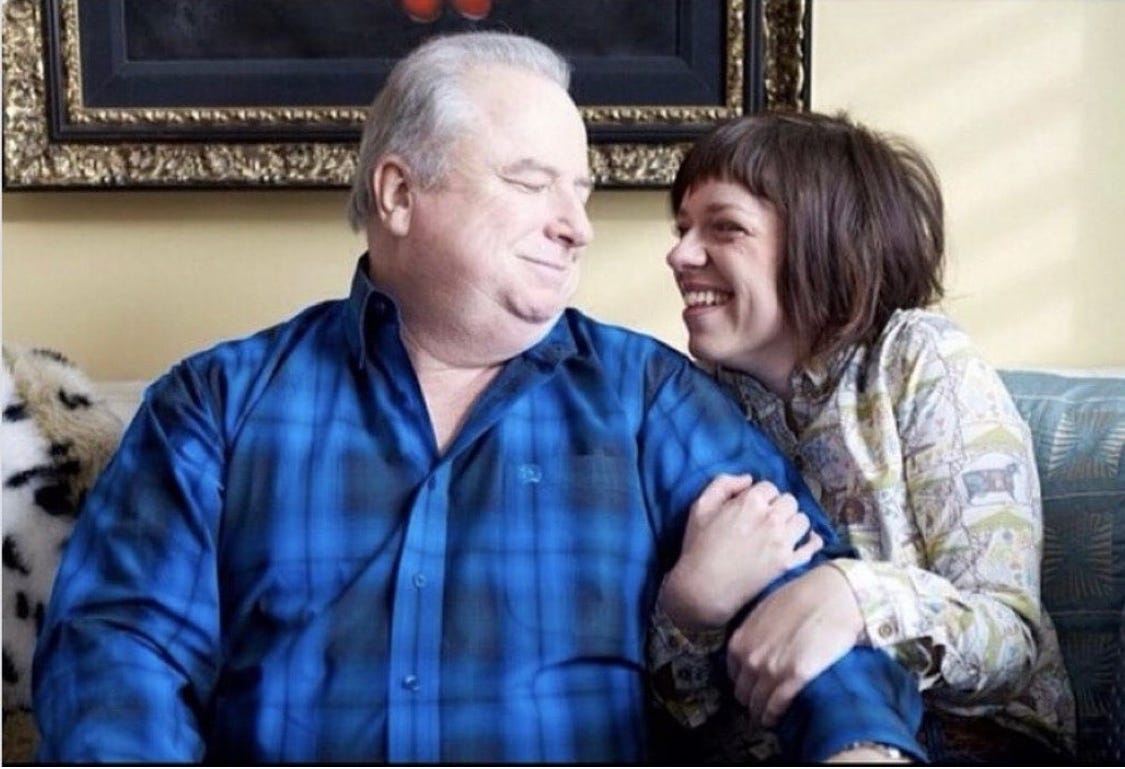
Riley’s asleep next to me as I write this. I know all the versions of his face over the past 25 years. I’ve known him nearly as long as I’ve known myself. We’re so different still, after all this time growing into one another. So I follow him, and he follows me. I guess that’s just really walking side by side, isn’t it?
Can I whisper something to you? It may be a quiet thing only I needed to hear. Please ignore it, if it doesn’t serve you -
Love is quintessence and it flows through each of us and the stars and God and dark energy and cosmic dawn and little girls with crushes on other little girls. Love binds and returns and renews. We do not need to be led, because love follows.


